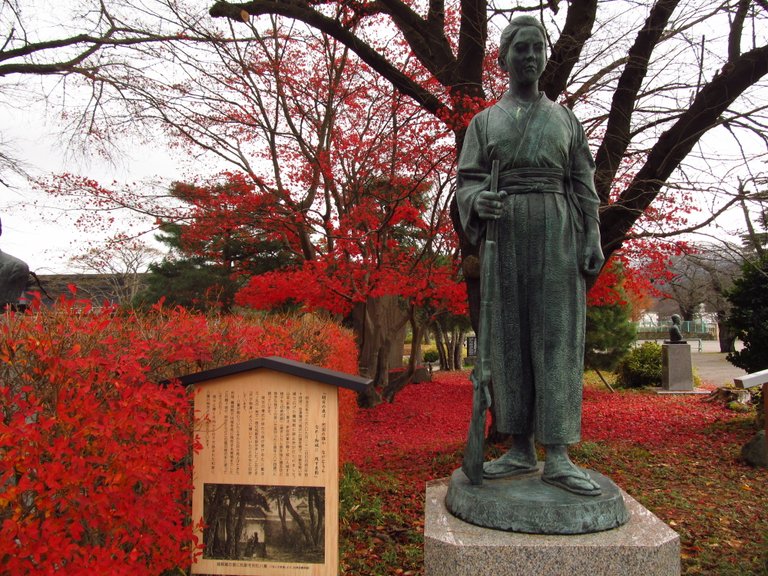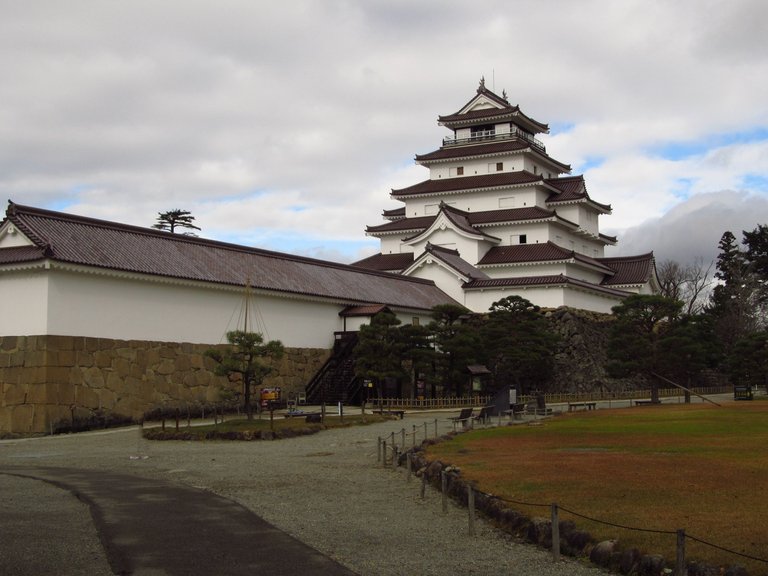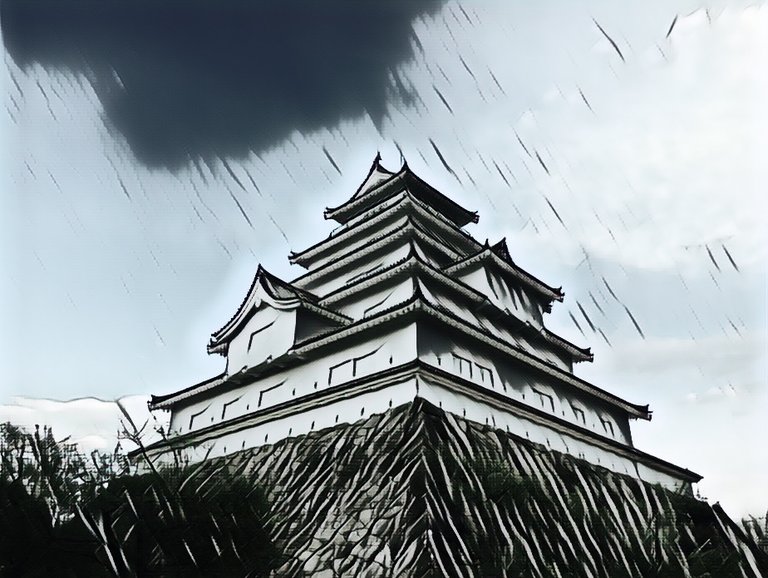On our last visit to Aizu-Wakamatsu, we visited Tsuruga-jo Castle and on our way there, we passed a statue with a fiery red maple tree in the background. Actually, the tree was the actual reason why we took a closer look at the statue, which depicts Niijima Yae, who lived from the end of the Edo period to the beginning of the Shōwa period. Her samurai family was part of the Aizu clan, which was loyal to the shogunate and fought against the imperial troops in the Boshin War. She herself was a so-called onna-musha (女武者 literally: woman-warrior) and fought with a rifle in the defense of the castle, which ultimately ended with the surrender of the Aizu clan.
She later worked as an educator and nurse and in reference to the British nurse Florence Nightingale was often referred to as the "Nightingale of Japan". She volunteered as a nurse in the First Sino-Japanese War and the Russo-Japanese War, and was later honored several times for her activities.
Next to her statue was a sign with a text in Japanese, which with the help of various translation programs I managed to translate into English.
At the hour of snake on the 22nd day of the 9th month of the first year of Meiji (1868) (around 10:00 a.m.), the Aizu clan raised the flag of "surrender" and put an end to the fierce battle fought over the castle. Yamamoto (Yae Niijima) said in her later years (at the age of 84) that she watched with regret as the new government forces entered Tsurugajo Castle, "clenching her teeth and clutching her arms tightly.
When the surrender ceremony was over and night fell, Yae composed a waka poem in a corner of San-no-maru. She later recalled that "the moon was shining like a terrible thing" at that time.
The castle that Yae had looked up at day after day since she could remember, the Tsurugajo Castle where she even prepared to die a martyr's death at the castle during a siege, would tomorrow fall into the hands of whom and in which hands.
Yae's regret is expressed in a waka poem she composed under the bright moonlight.
「明日の夜は何国の誰かながむらんなれ御城に残す月影」
`Ashita no yoru wa nani-koku no dare ka na ga mura n nare o shiro ni nokosu tsukikage'
Tomorrow night, who from what land will watch the moonlight over the castle?
For those who are interested, here is the text in Japanese and also the spelling in Romaji, the Latin alphabet.
明治元年(一八六八)九月二十二日巳の刻(午前十時頃)、会津藩は「降伏」の旗を掲げ、壮絶な戦いを繰り広げた籠城戦に終止符が打たれました。山本(新島八重は、新政府軍が鶴ヶ城に入城する様子を「切歯扼腕」歯ぎしりし腕を強く握るほど無念な様子)の思いで見守ったと晩年(八十四歳)に語っています。
降伏の儀式が終わり夜が更けると、八重は三ノ丸の一角で一首の和歌を詠みました。このとき「月が物凄いように輝いていた」とのちに回想しています。
八重が物心ついたときから日々見上げてきたお城、籠城戦では城を枕に殉死する覚悟までしたこの鶴ヶ城が、明日からどこの国の誰の手に渡ってしまうのか。
煌々と輝く月明かりの下で詠まれた和歌に、八重の無念さがめられています。
Meiji gan'nen (senhapyaku rokuju hachi) kugatsu nijuninichi hebi no koku (gozenjūji-goro), Aidzu-han wa "kōfuku" no hata o kakage, sōzetsuna tatakai o kurihirogeta rōjō-sen ni shūshifu ga uta remashita. Yamamoto (nījima yae wa, shin seifu-gun ga tsuru gajō ni nyūjō suru yōsu o "sesshiyakuwan" hagishiri shi ude o tsuyoku nigiru hodo munen'na yōsu) no omoi de mimamotta to ban'nen (hachi jū shi-sai) ni katatte imasu.
Kōfuku no gishiki ga owari yoru ga fukeru to, yae wa San'nomaru no ikkaku de ichi kubi no waka o yomimashita. Kono Toki `tsuki ga monosugoi yō ni kagayaite ita' to nochi ni kaisō shite imasu.
Yae ga monogokoro tsuita toki kara hibi miagete kita o-jō, rōjō-sende wa shiro o makura ni junshi suru kakugo made shita kono tsuru gajō ga, ashita kara doko no kuni no dare no te ni watatte shimau no ka.
Kōkō to kagayaku tsukiakari no shita de yoma reta waka ni, yae no munen-sa gamera rete imasu.
Tsuruga-jo Castle has only survived the storm of history because it was rebuilt in later years. But for this reason, it can still bear witness today to times that seem long gone, but are still very much connected to our present. Every time I come to Aizu Wakamatsu, I discover a new facet of this city in the heart of Japan. And of course I always plan a visit to this impressive castle, which I have already walked around several times. And which I hope to see many more times so that I can look at it anew each time with wide eyes and an open heart.




